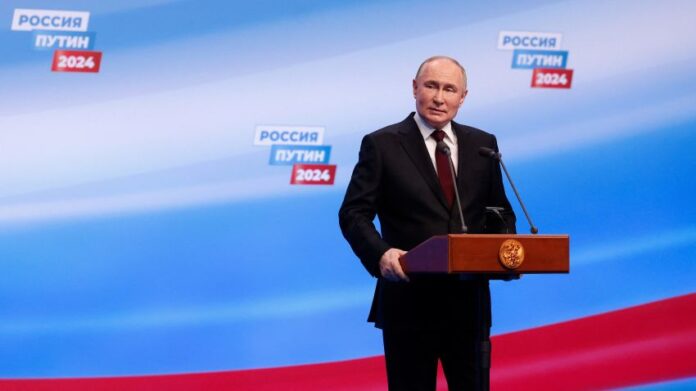Russian President Vladimir Putin delivered a stark warning to Western nations on Monday, cautioning that any direct engagement between Russia and NATO forces, particularly led by the U.S., could escalate global tensions to the brink of a third world war—a scenario he believes most would find undesirable. The ongoing conflict in Ukraine has heightened tensions between Moscow and Western countries to levels not witnessed since the Cuban Missile Crisis of 1962. Despite frequently underscoring the risks of nuclear conflict, Putin emphasized that the use of nuclear arms in Ukraine has never been deemed necessary from his perspective.
In a landmark triumph, President Putin secured an unprecedented victory in Russia’s recent election, consolidating his firm grip on power. Putin described this triumph as validation of Moscow’s stance against the West and its deployment of forces to Ukraine.
Putin, who assumed power in 1999 following a career as a KGB lieutenant colonel, stressed that the election outcome sends a clear message to Western leaders, emphasizing the necessity of engaging with a more assertive Russia in the foreseeable future.
At 71, Putin is set to embark on a new six-year term, potentially becoming the longest-serving Russian leader in over two centuries, surpassing Josef Stalin.
With an 87.8% vote share according to the Public Opinion Foundation (FOM) and 87% according to the Russian Public Opinion Research Centre (VCIOM), Putin secured the highest post-Soviet electoral result. Initial official results appear to corroborate these figures. However, several countries, including the United States, Germany, and the United Kingdom, have raised concerns about the election’s integrity, citing political detentions and media restrictions.
Communist contender Nikolai Kharitonov trailed in second place with nearly 4%, followed by newcomer Vladislav Davankov and ultra-nationalist Leonid Slutsky, according to preliminary results.
In his victory address in Moscow, Putin pledged to address challenges linked to Russia’s ongoing military actions in Ukraine and strengthen the Russian armed forces. He proclaimed unity as Russia’s strength, asserting that no adversary has succeeded, or will succeed, in intimidating or subduing them.
The crowd erupted into chants of “Putin” and “Russia” as he concluded his speech.
Despite the death of opposition leader Alexei Navalny in an Arctic prison, which sparked protests against Putin both in Russia and internationally, Putin dismissed the impact of these demonstrations on the election results, asserting that Russia’s electoral process is democratic.
Addressing Navalny’s death for the first time, Putin expressed sorrow and disclosed his willingness to consider a prisoner exchange involving Navalny shortly before his passing.



